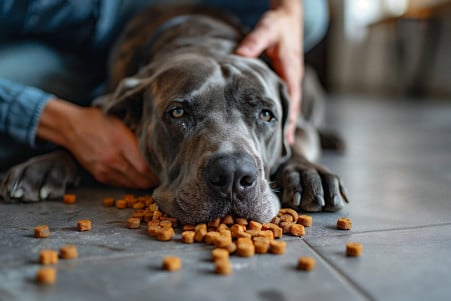Dog Digestion Time: How Long Does It Take?
25 May 2024 • Updated 25 May 2024

Have you ever wondered how long it takes your dog to digest the delicious meal they inhaled in seconds? On average, it takes dogs between 8-10 hours to digest their food from start to finish, but smaller dogs may digest a little faster and larger dogs may take a little longer to completely digest and absorb everything they've eaten.
To learn more about the ins and outs of dog digestion and what happens during this important bodily function, we'll take a deep dive into studies in the fields of veterinary medicine, animal nutrition, and animal physiology. This will help us understand the best feeding schedules, potential digestive problems, and the general time it takes to digest different types of dog food. By the end, you'll know exactly how to feed your dog to help them be as healthy and happy as possible.
How long does it take a dog to digest food?
What Determines How Long It Takes for a Dog to Digest Food?
Although the average time it takes for a dog to digest food is 8-10 hours, several factors can determine how long or short a dog's digestion time is. One of the biggest factors is the size of the dog. Smaller breeds like Chihuahuas have faster digestion times than larger breeds like Great Danes, according to Soopa Pets. Age is another factor, with puppies and senior dogs having longer digestion times than adult dogs.
The type of food a dog eats can also determine how long it takes for them to digest it. Foods that are high in fiber tend to move through a dog's digestive system more quickly, while foods that are high in fat take longer to digest, according to The Farmer's Dog. In addition, medications, health issues like inflammatory bowel disease, and the bacteria in a dog's gut microbiome can all impact how well a dog digests their food.
In addition to these biological and dietary factors, how a dog eats can also impact their digestion time. Eating too quickly and not chewing their food thoroughly can slow down digestion, while eating at the same time every day can help regulate it. As noted in Whole Dog Journal, the peristaltic movement that moves food through a dog's intestines is influenced by their eating habits. By taking these factors into account, dog owners can make sure they're meeting their dog's individual digestive needs.
Human Foods That Can Cause Digestive Issues in Dogs
There are many human foods that are not only bad for dogs but can also be toxic and cause serious digestive issues. For example, the American Kennel Club points out that chocolate, onions, garlic, and grapes all contain compounds that can shut down a dog's metabolism, resulting in symptoms like vomiting, diarrhea, and even seizures.
Other foods, such as high-fat items, bones, and too many treats, can also cause issues, including pancreatitis and intestinal obstructions, according to Pets Best. Dogs can also experience digestive upset if they're given a new food that they're not used to or if they're given human food that they've never had before.
In addition, Healthline says that dogs don't have the enzymes they need to properly digest dairy products, so giving them milk, cheese, or ice cream can lead to lactose intolerance and digestive issues. Finally, feeding dogs table scraps, garbage, or other non-dog food increases the likelihood of digestive issues.
How to Help Dogs With Digestive Problems
If your dog has a mild case of an upset stomach, you can fast them for 12-24 hours to help their digestive system reset, says WebMD. You can also help your dog recover by feeding them a bland diet of boiled chicken and rice, according to Pet Wellbeing. If your dog is vomiting, make sure they stay hydrated by giving them ice cubes or small amounts of water.
To help your dog with diarrhea, you can give them pumpkin, probiotics, and high-fiber foods to help improve their gut health, says Pet Wellbeing. That said, if your dog's digestive problems are serious or don't go away, you should take them to the vet so they can get the right diagnosis and treatment, according to Purina. By using a combination of at-home treatments and professional help, dog parents can help their pets get past digestive problems and maintain a healthy gut in the long run.
How to Support Your Dog’s Digestive Health
According to Diamond Pet Foods, it’s important to feed your dog a high-quality, balanced dog food that’s specially formulated to support digestive health. In addition, Animal Med Care Center recommends gradually introducing new foods to give your dog’s system time to adjust and reduce the likelihood of digestive issues. You can also help your dog avoid digestive problems by feeding them on a regular schedule and using puzzle feeders to slow down their eating.
Making sure your dog gets enough water is also important for supporting their digestive health, according to Home Alive. In addition, getting plenty of exercise and minimizing stress can help support your dog’s digestive system, which is especially sensitive to stress. By taking these steps, dog owners can help ensure their dogs have healthy digestion in the long term.
Conclusion: How to Help Your Dog's Digestive Health
Knowing how long it takes for a dog to digest food is important for understanding when something might be wrong. Many digestive issues can be avoided by being mindful of the foods that can cause them. If your dog does experience digestive issues, there are several home remedies that can help, but if your dog's digestive issues are severe, you should take them to the vet.
By feeding your dog a high-quality diet and maintaining good habits, you can help your dog avoid digestive issues. With a little bit of knowledge and effort, you can make sure your dog is comfortable and healthy.


